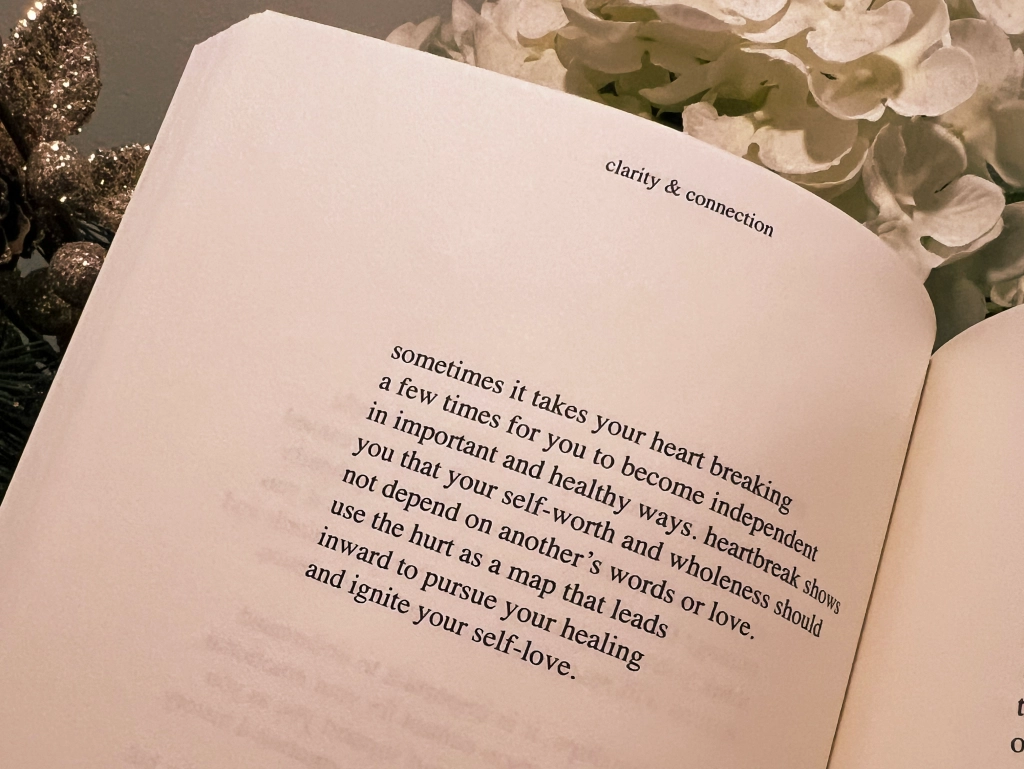
What advice would you give your teenage self?
— WordPress Daily Prompt (February 23, 2024)
It’s been a while since I’ve checked out the WordPress Prompts and last week’s was an interesting one that had me thinking.
If there’s one piece of advice I would give my teenage self, it would be to understand that loving people doesn’t mean you let them hurt you. This applies to friendships, family, and of course, relationships. It could also really extend to how much time and love you put into your job and how it treats you in return. But as a teenager, I compromised my feelings a lot of times for others. I never stood up to bullies, I let “friends” practice passive aggressive communication, use me as a punching bag, and by the time I got into my early 20s, I let a lot of things slide.
While I like to think I’ve made some solid progress in understanding my heart over the years and what it endured, there’s a short prose that has stuck with me from Yung Pueblo’s book, Clarity & Connection. He wrote:
“Sometimes it takes your heart breaking a few times for you to become independent in important and healthy ways. heartbreak shows you that your self-worth and wholeness should not depend on another's words or love. use the hurt as a map that leads inward to pursue your healing and ignite your self-love.”
Though I sought solace in books growing up, I sometimes wish I had Pueblo’s works available because it would have really helped navigate my feelings and thoughts as a young woman. Keeping these words close to my heart, I’ve felt they speak strongly to one specific relationship and how it greatly influenced who I am today.
Almost 15 years ago, I fell in love with someone I trusted and deeply valued as a true friend. I thought the world of him and did for years even when he ghosted me for periods of time and only returned when he needed something. I cared about him so much that when we parted ways, I was quick to forgive him for all the hurt inflicted on me. But the truth of the matter was, I didn’t feel it in my heart days later — the weight of relief and letting go. Almost a decade later, I realize I didn’t need to forgive him because he really hurt me.
In ignoring my own feelings for his so that he could get off the hook and my love for him would be “noble,” it ate at me. For the first time in my life, I wondered why I let someone I love and care for walk all over me. I began to hate myself because I didn’t understand why I felt so much pain for someone who made it so easy to just let go. But it should have made sense because he initiated everything, so it was like playing one of his video games. He could turn it off when he wanted to. He was every bit of the “casually cruel in the name of being honest” type.
Looking back, I didn’t see the red flags because it was a relationship through rose-colored glasses. Only now do I understand how he treated me in those microscopic moments spoke to a larger view of his character. He dehumanized me because he was protecting himself and it always stemmed from his perpetual unhappiness. It spoke a lot to his privilege, what it means to be a man who gets the last word, and the toxic environment of imbalance he had succumbed to, both internally and externally. But to the open-hearted me who trusted him with my heart, he could do no wrong — like that time he scolded me on the phone for not picking up in time or telling me to “shut up” when I tried to explain myself mid-argument. Or that time he manipulated my vulnerability to get what he wanted when I had just revealed to him my maternal grandma’s death.
When I was an up-and-coming reporter making coffee money, a work interview went past our “date night” hour and I felt awful. But instead of him understanding or being supportive knowing I needed this assignment to get my foot in the door, he got pissy after I got off and ghosted me for a week. He went on to pretend we never had “date night.” The gaslighting and lying were real. But I endured it because I thought it was love and he always came around most sweetly and tenderly, using humor to connect us back.
But in all the ways he hurt me, I realized in the years that followed how loving yourself and others unconditionally needs to be a balance between protecting yourself and giving yourself to others. Whatever was left across the purest parts of my shattered heart, I put into my work — all my writing and poetry, the fragmented script we once worked on, even the on-camera conversations I have with industry talent about love and relationships to this day — all of it. I let all of that guide me to where I am now and I feel better for it. I don’t feel that pulsing ache, even though it has definitely left a scar.
I am not saying a broken heart is a blessing and a module in “Self-Discovery 101,” but I am saying I found my own way through it and used that hurt as a road map. I took all of that love and pain and planted it into something else, which meant I got to share another variation of that love with those around me. Not only has this all helped me understand love and the type of partner I want, but it reinforces how everything starts with loving myself first.



You must be logged in to post a comment.